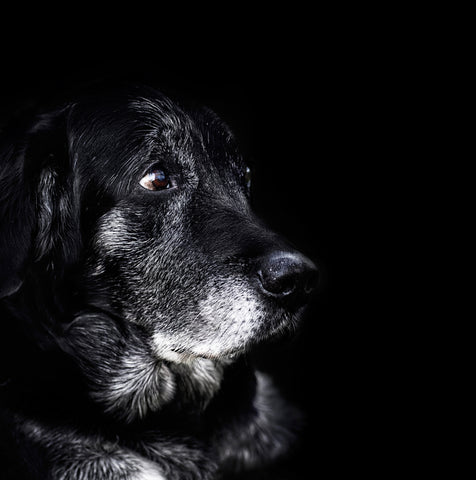Identifying and Managing Senior Dog Dementia

Here are some common signs and symptoms to keep an eye out for:
- Loss of learnt behaviors - absence of toilet training or decreased response to known cues
- Disorientation / confusion - staring at walls or getting lost in corners
- Increased anxiety - restlessness or agitation, increased dependence on family members, separation anxiety when apart
- Compulsive behaviors - vocalization for no apparent reason
- Changes in sleep wake cycles - increased sleep during the day and restlessness at night
Keep in mind that even if your dog demonstrates one or more of these symptoms it does not guarantee that they have dementia since there are other possible causes, but keeping an eye out for this behavior will certainly help your vet with their diagnosis and increase the success of treatment.
I think it is difficult at times to be able to separate "normal" senior dog behavior from behavior caused by a medical condition because older dogs do change and adapt. In fact at times our seniors can become quite bossy and even a bit neurotic, but seem completely in control and purposeful in their idiosyncrasies. I did this video a while back on Mackenzie and his vocalization. Perhaps he was displaying compulsive behavior or perhaps he just figured out that I would cater to his every wish if he was loud enough ;) Here is the video: https://www.youtube.com/watch?v=2oKRYwRc2K4
If you are like me then the older your dog becomes, the stronger your relationship is with your vet since you find yourself visiting more and more. As you discuss the changes you are seeing in behavior, your vet will be able to help determine whether your dog is showing signs of Canine Cognitive Dysfunction Syndrome. As with humans, there is no cure, but the good news is that the signs and symptoms of CDS may be lessened and the progression diminished by use of medications, supplements, pheromones, diet or even mental enrichment. And with the varying degrees of this condition, most dogs continue to live very happy lives.
Here are some steps you can take to help ensure they remain happy and safe:
- Talk to your vet about food, medication and especially supplements that can help slow down the decline and potentially reduce many of the symptoms.
- Keep your dog mentally stimulated. Just because your dog is getting older and may be having some trouble due to CDS, it does not mean that you should stop exercising their mind. Not only will this help to improve their spirit, but it can also help to slow the decline. Some great ways to keep your senior dog stimulated include: taking them for walks in new areas so they see new sights and breathe in new smells, even if this walk is in a dog stroller; hide the treat games or puzzles, even playing with them in different ways will help.
- Simplify your household to ensure that obstacles are minimized and the layout becomes as straightforward as possible. This will help to keep them safe and calm. Gating off stairs is also a good idea.
- Be patient - one of the benefits to having your vet involved is so you can better understand the changes your dog is going through. Household accidents and their loss of learnt behaviors can become frustrating if you do not know the cause. As they change we need to also change to help them to better adapt. Learn to read their cues and react accordingly. You may need to take them outside more often for bathroom breaks, or you may need to rely on a diaper or a belly band to help prevent accidents. You may need to change the location of their water and food to ensure they are finding it without issue. Rather than getting frustrated, get creative!
- Be careful - a lot of senior dogs with CDS will stand very close to doors and may not move away when you open them. You may find your dog walks closer to your feet than previously so be aware of their proximity as you move around. Also keep an eye out for the interaction with other dogs in your family to ensure that everyone is getting along as they should be. Sometimes with the increased anxiety or confusion there can be reactions that may rub other family dogs in the wrong way so be aware of the body language and give them space from each other when needed.
As our dogs get older they often need us more than any other time in their lives. It's our chance to repay them for doing so much for us over the years, so rather than feeling sad, please look at this time as a new chapter. You can still be happy together, you just need to find new ways to enjoy life. I am sure you will find that your bond with each other grows stronger and even more meaningful than you could ever have imagined. I like the person I have become by having the privilege of caring for my dogs throughout this stage of life and I am sure you will too.
Ann-Marie Fleming is the Founder & CEO of Dog Quality, a provider of products focused on improving the quality of life for older dogs.

